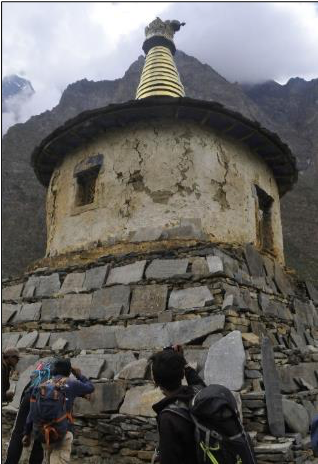First published on 08/29/2015, and last updated on 03/29/2018
By: Jailab Rai, Honorary member of the ICCA Consortium, Researcher for Forest Action Nepal and Lecturer at the Anthropology Department, Tribhucan University, Nepal
The 7.9 magnitude earthquake that hit Nepal on April 25, 2015 and hundreds of aftershocks including another big shock on May 12, 2015 (7.3 M) have caused widespread devastation across the country. More than 8,500 people were officially declared dead and more than 22,000 injured. More than 4.8 million households are completely destroyed, 2.6 million partially damaged and their million inhabitants have been affected across the country. Among the seventy-five districts of the country, fourteen have been severely affected, and twenty-five modestly affected. This disaster not only brought human losses and property damages but also greatly impacted the cultures and values associated with nature and biodiversity, including some Territories and Areas Conserved by Indigenous Peoples and Local Communities (ICCAs). Many geographical areas damaged by the earthquake are traditional homelands to indigenous peoples (e.g., Tamang, Gurung, Sherpa and Newars) and the majority of the affected population (by human loss or displacement) also belongs to these indigenous communities.
Cultural, linguistic, religious and ecological diversity constitutes an invaluable characteristic of the country and its identity. The latest national census (2011) identified more than 125 castes and ethnic groups, 92 languages, and 10 religions. This diversity means diverse values of understanding, meaning, and interaction with the environment, including its biological diversity. Hundreds of communities across various eco-regions of the country govern great ICCA examples. Some of these communities were identified, documented and supported to promote learning exchange and to share their nature conservation initiatives. Since 2010 they had organized themselves into an informal network called the “ICCA National Network Nepal” which counts 29 community members from several eco-regions. Hundreds of ICCAs of different types exist in the country without having been legally recognized nor having any strong internal organization. Hundreds of ICCAs yet to be identified, documented and welcomed into the ICCA network were undoubtedly severely affected by the recent earthquake.
In the Northern part of the Gorkha district, close to the earthquake’s epicentre, the Tsumba people live in the Tsum valley. They have officially declared their territory as an ICCA and dedicated themselves to non-violence over 95 years ago. The Tsumba have been promoting their culture, cultural practices and non-violence values for generations. They also take care of many cultural monuments such as Buddhist Gumpas and monasteries. But most of these have been damaged by the disastrous earthquake, as well as individual properties. Similarly, other ICCAs such as Khumbu and Pungmo, are reported as severely damaged and their reconstruction is difficult due to their geographical remoteness.
Apart from state-level support, hundreds of national and international non-governmental organizations, associations, networks, including individuals have until now supported the earthquake victims in Nepal. In parallel with the government’s efforts, international communities have demonstrated very encouraging commitments (about 450 billion Nepalese Rupees against the 700 billion NR required in the preliminary assessment of the Nepal government) to support reconstruction work. Still, reconstruction remains a big challenge for the Nepalese government considering its limited economic, administrative and financial capacities. The risk of losses in culture and cultural properties is high. In this context, ICCA Network Nepal, supported by the technical facilitation of ForestAction Nepal and international friends has also initiated an effort to promote solidarity among the earthquake affected communities and ICCAs in Nepal.
 An appeal letter, aimed at global communities and especially members and individuals related or associated with the ICCA Consortium, has been communicated to call for financial support toward ICCAs in Nepal. The secretariat members of the ICCA Network Nepal have taken some key decisions regarding fund collection and governance: (a) the collected fund will be distributed to ICCA National Network members that have been severely damaged by the earthquake; (b) the collected fund will be used only for the reconstruction of community/public properties or buildings such as Gumpas (Buddhist temples), monasteries, community health centres etc.; (c) the funds are collected in one of ForestAction’s official accounts, because the national network is not an official organization and hence does not have an official bank account. ForestAction will channel the collected funds as per the decision of secretariat members of the ICCA Network Nepal without charging any of the management or other costs. The secretariat members of the network will take the decisions on fund repartition after assessing its members’ proposals and applications.
An appeal letter, aimed at global communities and especially members and individuals related or associated with the ICCA Consortium, has been communicated to call for financial support toward ICCAs in Nepal. The secretariat members of the ICCA Network Nepal have taken some key decisions regarding fund collection and governance: (a) the collected fund will be distributed to ICCA National Network members that have been severely damaged by the earthquake; (b) the collected fund will be used only for the reconstruction of community/public properties or buildings such as Gumpas (Buddhist temples), monasteries, community health centres etc.; (c) the funds are collected in one of ForestAction’s official accounts, because the national network is not an official organization and hence does not have an official bank account. ForestAction will channel the collected funds as per the decision of secretariat members of the ICCA Network Nepal without charging any of the management or other costs. The secretariat members of the network will take the decisions on fund repartition after assessing its members’ proposals and applications.
